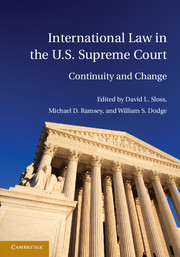Book contents
- Frontmatter
- Contents
- List of Contributors
- Table of Cases
- Acknowledgments
- Introduction
- PART I FROM THE FOUNDING TO THE CIVIL WAR
- PART II FROM THE CIVIL WAR TO THE TURN OF THE CENTURY
- PART III FROM THE TURN OF THE CENTURY TO WORLD WAR II
- PART IV FROM WORLD WAR II TO THE NEW MILLENNIUM
- PART V INTERNATIONAL LAW IN THE U.S. SUPREME COURT IN THE TWENTY-FIRST CENTURY
- V.A TREATIES AFTER 2000
- V.B CUSTOMARY INTERNATIONAL LAW AFTER 2000
- V.C INTERNATIONAL LAW AND CONSTITUTIONAL INTERPRETATION AFTER 2000
- V.D INTERNATIONAL LAW AND STATUTORY INTERPRETATION AFTER 2000
- Main Essay – Empagran's Empire: International Law and Statutory Interpretation in the U.S. Supreme Court of the Twenty-First Century
- Response Essay – Loose Canons: International Law and Statutory Interpretation in the Twenty-First Century
- Response Essay – Empagran: Empire Building or Judicial Modesty?
- V.E INTERNATIONAL LAW AND THE WAR ON TERROR
- VI CONCLUSION
- Index
- References
Main Essay – Empagran's Empire: International Law and Statutory Interpretation in the U.S. Supreme Court of the Twenty-First Century
Published online by Cambridge University Press: 05 July 2011
- Frontmatter
- Contents
- List of Contributors
- Table of Cases
- Acknowledgments
- Introduction
- PART I FROM THE FOUNDING TO THE CIVIL WAR
- PART II FROM THE CIVIL WAR TO THE TURN OF THE CENTURY
- PART III FROM THE TURN OF THE CENTURY TO WORLD WAR II
- PART IV FROM WORLD WAR II TO THE NEW MILLENNIUM
- PART V INTERNATIONAL LAW IN THE U.S. SUPREME COURT IN THE TWENTY-FIRST CENTURY
- V.A TREATIES AFTER 2000
- V.B CUSTOMARY INTERNATIONAL LAW AFTER 2000
- V.C INTERNATIONAL LAW AND CONSTITUTIONAL INTERPRETATION AFTER 2000
- V.D INTERNATIONAL LAW AND STATUTORY INTERPRETATION AFTER 2000
- Main Essay – Empagran's Empire: International Law and Statutory Interpretation in the U.S. Supreme Court of the Twenty-First Century
- Response Essay – Loose Canons: International Law and Statutory Interpretation in the Twenty-First Century
- Response Essay – Empagran: Empire Building or Judicial Modesty?
- V.E INTERNATIONAL LAW AND THE WAR ON TERROR
- VI CONCLUSION
- Index
- References
Summary
Introduction
The Empagran decision concerned a global price-fixing agreement between mostly European producers of certain vitamin products, resulting in some $7 billion in overcharge. Once the cartel was discovered, several types of law enforcement took place. One was public enforcement: the U.S. Department of Justice, the European Commission, and the antitrust agencies of several other countries imposed stiff administrative fines. Another was private domestic enforcement: a class action by U.S. purchasers ended in a billion dollar settlement; separate proceedings in other jurisdictions led to further payments, although at far lower amounts. The most interesting proceedings were the actions brought in the Empagran case. Plaintiffs had purchased vitamin products in countries other than the United States, many of which do not provide the means for proper public or private prosecution against the cartel – including Ecuador, Panama, and Ukraine. They nonetheless brought suit in U.S. federal court and alleged applicability of the Sherman Act under their reading of the effects doctrine as formulated in the Foreign Trade Antitrust Improvement Act: the price fixing had an effect on the U.S. market, even though these particular plaintiffs had not suffered their particular injuries as participants in the U.S. market. Justice Stephen Breyer held, for a unanimous court, that the plaintiffs' claim was not covered.
Empagran is often discussed as a decision representing a transnationalist approach to statutory interpretation in accordance with the demands of globalization; Justice Breyer himself has referred to it in this sense in lectures.
- Type
- Chapter
- Information
- International Law in the U.S. Supreme Court , pp. 533 - 546Publisher: Cambridge University PressPrint publication year: 2011
References
- 2
- Cited by



